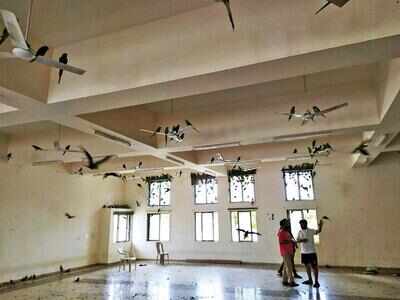- News
- City News
- rajkot News
- Tauktae-hit parrots get healing touch from cops
Tauktae-hit parrots get healing touch from cops

The training centre for personnel on Amreli headquarters campus was converted into hospital for the injured parrots
Rajkot: Two enormous banyan trees in the Amreli police headquarters not just enhanced the campus’ greenery, but were also homes to thousands of parrots whose constant squawking was a music to cops’ ears throughout the day.
But cyclone Tauktae, which hammered Amreli on May 17 and 18, uprooted both these decades-old trees. If losing these trees was a heartbreak, the sweet sound of parrots too fell silent as nearly 1,000 died and others got injured.
But cops, despite their cyclone-aftermath duties, took time out to ensure that every injured parrot got treatment and started chirping in their natural environment again. What’s more, the hospital for these parrots was set up in the training centre of the police headquarters where members of a non-government organization (NGO) and veterinary doctors were roped in.
Talking to TOI, Amreli superintendent of police, Nirlipt Rai, said, “There were around 3,000 parrots on trees and policemen rescued around 2,000 which could survive the injuries. They were brought to the training centre and we called a veterinary doctor to treat these birds. After ensuring they were fit to fly, all were released.”
The injured birds were first spotted by Harun Rais, an assistant sub-inspector who also lives in the headquarters campus with his family. Rais and two trainee policemen had gone out to see the extent of damage on the second day of the cyclone.
"It was routine for me and my children to hear the chirping of the birds. It was heartbreaking for me to see dead and injured birds. I called other trainee policemen and we all rescued the birds and took them to the training centre,” Rais said.
“The sight of so many parrots and doves lying injured, some crushed beneath branches, was tragic. We took help from bird lovers and volunteers who worked hard for their treatment,” said another official in the headquarters.
Besides policemen, several people used to flock near the banyan trees only to see the birds and listen to their chirping in the mornings and evenings. In fact, locals of Amreli town regularly visited the headquarters with corn to feed the injured birds.
But cyclone Tauktae, which hammered Amreli on May 17 and 18, uprooted both these decades-old trees. If losing these trees was a heartbreak, the sweet sound of parrots too fell silent as nearly 1,000 died and others got injured.
But cops, despite their cyclone-aftermath duties, took time out to ensure that every injured parrot got treatment and started chirping in their natural environment again. What’s more, the hospital for these parrots was set up in the training centre of the police headquarters where members of a non-government organization (NGO) and veterinary doctors were roped in.
Talking to TOI, Amreli superintendent of police, Nirlipt Rai, said, “There were around 3,000 parrots on trees and policemen rescued around 2,000 which could survive the injuries. They were brought to the training centre and we called a veterinary doctor to treat these birds. After ensuring they were fit to fly, all were released.”
The injured birds were first spotted by Harun Rais, an assistant sub-inspector who also lives in the headquarters campus with his family. Rais and two trainee policemen had gone out to see the extent of damage on the second day of the cyclone.
"It was routine for me and my children to hear the chirping of the birds. It was heartbreaking for me to see dead and injured birds. I called other trainee policemen and we all rescued the birds and took them to the training centre,” Rais said.
“The sight of so many parrots and doves lying injured, some crushed beneath branches, was tragic. We took help from bird lovers and volunteers who worked hard for their treatment,” said another official in the headquarters.
Besides policemen, several people used to flock near the banyan trees only to see the birds and listen to their chirping in the mornings and evenings. In fact, locals of Amreli town regularly visited the headquarters with corn to feed the injured birds.
FacebookTwitterLinkedinEMail
end of article
Quick Links
Delhi Air PollutionDelhi TemperatureChennai WeatherBangalore TemperatureCovid vaccination centres in DelhiCoronavirus in DelhiRTPCR test in GurgaonHyderabad RainPollution level in BangaloreDelhi SmogDelhi TemperatureNoida AQIGurgaon AQI todayFire in MumbaiMumbai RainsCovid 19 RT PCR Test in NoidaDelhi AQI todaySrinagar encounter
